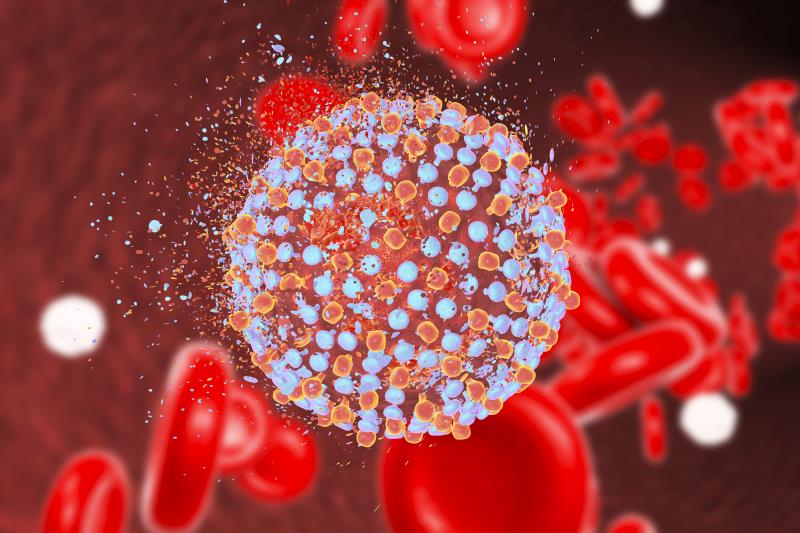
The use of low-dose aspirin was associated with a significantly lower risk of incident hepatocellular carcinoma (HCC) and liver-related mortality in patients with chronic viral hepatitis compared with no aspirin use, according to a recent Swedish study.
“Worldwide, more than 500,000 cases of incident HCC are diagnosed each year, related primarily to chronic infection with hepatitis B or C virus … The incidences of cirrhosis and HCC have increased dramatically in the US and Europe, and mortality from HCC is increasing faster than that from any other cancer,” said the researchers.
Using data from the Swedish Register for Surveillance of Communicable Diseases, the researchers identified 50,275 adults diagnosed with hepatitis B (n=13,276) or hepatitis C (n=36,999), of whom 14,205 were aspirin users (mean age 50.5 years) for ≥90 consecutive cumulative defined daily doses and 36,070 were nonusers (mean age 39.6 years). [N Engl J Med 2020;382:1018-1028]
Over a median follow-up of 7.9 years, a total of 1,612 incident cases of HCC and 5,017 liver-related deaths were reported.
The 10-year cumulative incidence of HCC was significantly lower among aspirin users compared with nonusers (4.0 percent vs 8.3 percent; absolute risk difference, -4.3, 95 percent confidence interval [CI], -5.0 to -3.6; p<0.001).
Patients who received aspirin also had a significantly lower risk of liver-related mortality than those who did not receive aspirin at 10 years (11.0 percent vs 17.9 percent; absolute risk difference, -6.9, 95 percent CI, -8.1 to -5.7; p<0.001).
After multivariable adjustment, aspirin users demonstrated a 31 percent and 27 percent lower risk of incident HCC and liver-related death, respectively, compared with nonusers (adjusted hazard ratio [adjHR], 0.69 and 0.73).
Compared with short-term use of aspirin (3 months to 1 year), a significantly lower risk of HCC was observed with longer duration of aspirin use at 1 to <3 years (adjHR, 0.90), 3 to <5 years (adjHR, 0.66), and ≥5 years (adjHR, 0.57). “[This] inverse relationship between aspirin use and the risk of HCC appeared to be duration-dependent, even after the population was restricted to aspirin users,” said the researchers.
However, those who discontinued aspirin after 1 year had a greater risk of HCC (n=99; subhazard ratio, 1.22) and liver-related death (n=223; subhazard ratio, 1.31) than those who continued taking aspirin.
Nonetheless, there was no significant difference in the occurrence of any gastrointestinal (GI) bleeding (7.8 percent vs 6.9 percent; risk difference, 0.9) or major GI bleeding events (1.8 percent vs 1.3 percent; risk difference, 0.5) between the aspirin users and nonusers.
In a subgroup analysis of aspirin users with and without compensated cirrhosis, similar risks of any GI (8.3 percent and 7.5 percent, respectively) or major GI bleeding events (3.6 percent and 2.4 percent) were observed. However, caution is warranted in interpreting this result, mainly due to a relatively small number of patients in this subgroup, the researchers noted.
“In conclusion, in a nationwide population of persons with chronic viral hepatitis, low-dose aspirin use was associated with a duration-dependent significantly lower risk of incident HCC and liver-related death than no use of aspirin,” the researchers said.
“[This current study also showed that] the benefits [of aspirin] were not accompanied by a substantially higher incidence of GI bleeding … Although this finding is noteworthy, before aspirin can safely be incorporated into guidelines for prevention of HCC, further research is needed to define its potential hazards across the complete spectrum of liver diseases,” the researchers added.